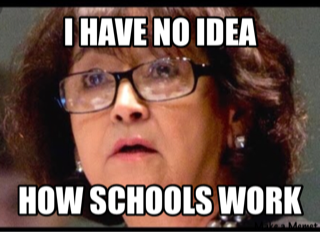Like US Secretary of Education Betsy DeVos, Tennessee Senate Education Committee Chair Dolores Gresham appears not to know how schools actually work.
Yes, apparently Gresham believes that parents in Tennessee must present a driver license, birth certificate, passport, certificate of citizenship, certificate of naturalization or a US citizen ID card to enroll their child in public school. Would she be shocked to know that all you really need is a utility bill with your address? Unless you and your child are homeless and then you just have to declare that you are homeless and living in the district.
Gresham made the remarks during debate on Governor Bill Lee’s voucher plan. The Senate version, sponsored by Gresham, contains a provision previously declared unconstitutional by the Supreme Court in the case of Plyler v. Doe. DeVos made a similar error in explaining how students register for school during testimony last year.
When asked about the provision by committee member Raumesh Akbari, Gresham replied that she believed this was “routine” and “no different than what is required of traditional public school students.”
Perhaps if she actually spent time with public school educators listening to and understanding them — rather than lecturing them on their greed, as she did during the voucher debate — she might know how schools work.
In addition to her remarks demonstrating a basic understanding of what is required to register for school, Gresham said that public school principals too often view students as “profit centers.” Apparently, in Gresham’s world, Tennessee school principals are rounding up kids so they can enroll them and cash in on the huge payout from the state’s BEP funding formula.
She’s been at this for a long time, folks. There’s really just no excuse for this level of ignorance.

For more on education politics and policy in Tennessee, follow @TNEdReport
Your support makes reporting education news possible.







